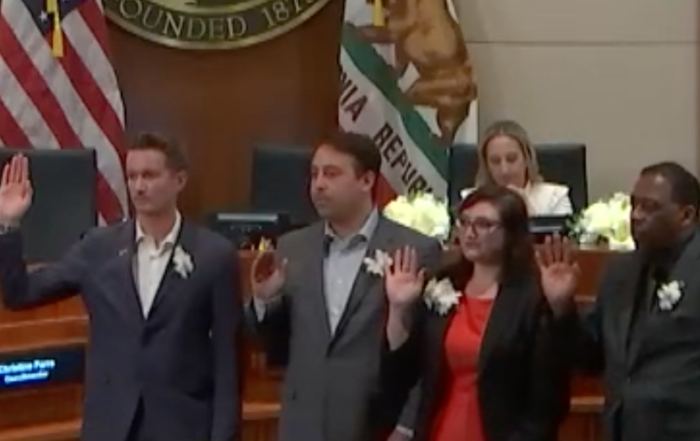One of the largest mass evictions in Los Angeles history seems to have been put to a stop.
Los Angeles County Superior Court Judge H. Jay Ford, III issued a tentative ruling Thursday in favor of the Barrington Plaza Tenant Association over defendants Douglas Emmett — the landlords at Barrington Plaza attempting to clear the 712-unit building for fire sprinkler installation.
In this ruling, Judge Ford concluded that Douglas Emmett did not provide enough evidence or arguments that proved that the firm was compliant with the Ellis Act — the housing law that they were arguing gave them the legal right to evict the tenants, nor that they were legal under Los Angeles’s Rent Stabilization Ordinance (RSO). The state law allows landlords to remove their rental units from the market, but only to get out of the rental business, while the local ordinance protects tenants from no-cause evictions.
Judge Ford detailed several key factors presented as evidence in the case that led to his decision. Most importantly, he determined that Douglas Emmett intended to return to the rental market once the installation of fire sprinklers was completed, which was a deciding factor in many aspects of Ford’s ruling.
This intent directly violated the Ellis Act, which was meant to be used as a safety net for mom-and-pop landlords to exit the rental business while minimizing losses. Judge Ford determined that there was clear intent to relet the units to new tenants after the renovations, citing emails from Douglas Emmett President and CEO Jordan Kaplan.
Lawyers for Douglas Emmett argued that there was no element of time specified in the Ellis Act with regards to the term “going out of business,” which meant there was no specific duration that they had to stay out of the market to qualify as going out.
Going out of business implies permanence from most people’s perspective, which was the counterargument from the Barrington Plaza tenant side. While Judge Ford did not go so far as to say that going out of business meant leaving forever, it does require “A genuine intent to withdraw the units from the rental market indefinitely and with no present intent to return those units to the rental market,” according to the decision.
In this case, the court ruled that there was a “present and continuing intent” to return the units to the residential rental market, thus making these evictions unprotected by the Ellis Act.
“Everything [Douglas Emmett] said or did after the 2020 fire showed that [Douglas Emmett] intends to relet Barrington Plaza once its renovations are completed,” the ruling read.
With the Ellis Act deemed an invalid basis for these evictions, the focus turns to whether or not local legislation would allow for these evictions. Douglas Emmett did not have great footing to make an argument on this front, as they quickly moved to ignore the Tenant Habilility Program (THP) included in Los Angeles’ Rent Stabilization Ordinance.
The THP requires that landlords making renovations like those for fire safety to units submit to the program with the plan to relocate the tenants temporarily while the upgrades are made. Douglas Emmett quickly struck down the idea of using the THP as “not workable,” which the court determined was a speculative assessment.
However, the court went against them in this regard as well, ruling that time was not a factor and instead considering the state of mind and intent of Barrington Plaza’s landlords when they filed to remove the units. As they intended to return to the rental business with Barrington Plaza units after renovations were completed, the evictions violated the RSO.
Douglas Emmett’s lawyers attempted to use a perceived conflict between the RSO and the Ellis Act as justification, arguing that the RSO’s requirement to have the intent to permanently remove units from the rental market to carry out a no-cause eviction was preempted by the Ellis Act, which does not specify time.
Similar to his previous ruling, Ford wrote that intent was the most important factor and that there was no conflict between the two laws. There is nothing that prevents a landlord from exiting the business and changing his mind later down the road, which allows it to coexist with the Ellis Act.
“Because the RSO requires a landlord to prove it has genuine intent to permanently remove its rental unit from rental housing use does not conflict with the Ellis Act’s protection of a landlord’s right to leave the rental housing business, the RSO is not preempted by the Ellis Act,” Ford’s ruling reads.
Finally, Douglas Emmett’s counsel attempted to argue that the units were being demolished for these repairs because they would be uninhabitable. Judge Ford briefly addressed this topic, but quickly ruled that the landlords did not prove an intent to demolish the units, which would also allow them to legally evict tenants without cause.
While tentative rulings are generally almost identical to final rulings, there will be an appeal process open for 10 days following the release of the decision, which effectively ends Friday as courts are closed on weekends.
Stay informed. Sign up for The Westside Voice Newsletter
By clicking submit, you agree to share your email address with Westside Voice. We do not sell or share your information with anyone.








